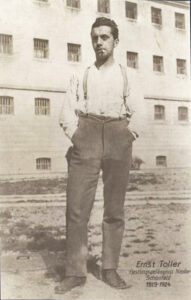An interview with Prisoner Number 12,909
by Graeme Atkinson
first appeared in Searchlight No 281, November 1998
WERNER HÄNDLER was born in 1920 in Bismarckhütte, Upper Silesia, which became part of Poland under the terms of the post-First World War Versailles Treaty.… read on...
 A figure who has received surprisingly little attention in the UK is Ernst Toller. (The honourable exception is Richard Dove’s ‘
A figure who has received surprisingly little attention in the UK is Ernst Toller. (The honourable exception is Richard Dove’s ‘